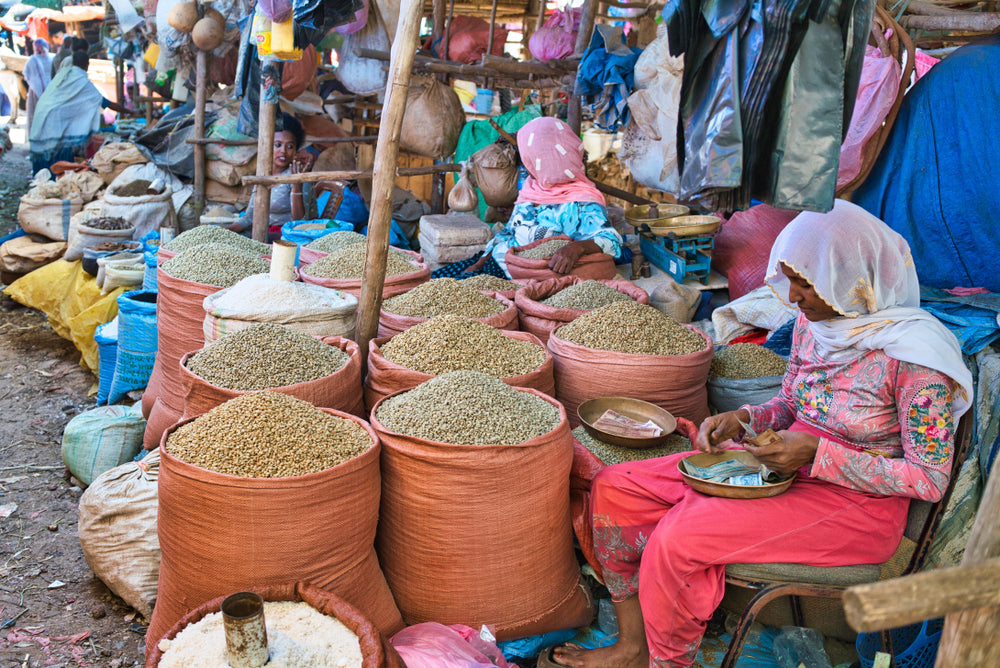Add description, images, menus and links to your mega menu
A column with no settings can be used as a spacer
Link to your collections, sales and even external links
Add up to five columns
Add description, images, menus and links to your mega menu
A column with no settings can be used as a spacer
Link to your collections, sales and even external links
Add up to five columns

Ethiopian Coffee Farmers and Climate Change
October 04, 2018 2 min read
Ethiopian Coffee Farmers and Climate Change
Ethiopian Coffee Crisis: Climate Change Threatens Coffee Industry
Ethiopia, renowned as the birthplace of Arabica coffee, boasts a thriving coffee industry pivotal to its economy. Nonetheless, the specter of climate change looms large over Ethiopia's coffee farmers, presenting an imminent threat.
A recent study featured in Nature Plants forewarns that Ethiopia may face a staggering loss of 39% to 59% of its present coffee cultivation regions by the century's end. Climate change-induced rising temperatures and dwindling rainfall pose formidable challenges, impeding the flourishing of coffee plants.
How Can Ethiopian Coffee Farmers Adapt to Climate Change
Adapting to this adversity, coffee farmers in Ethiopia could potentially relocate their plantations to higher elevations. However, this endeavor is rife with complexities, necessitating extensive coordination and resources that many farmers lack.
According to coffee authority Wondyifraw Tefera, it's probable that Ethiopia will witness a reduction in coffee cultivation areas and farms. While coffee cultivation might shift to higher altitudes, this might not adequately compensate for the overall loss of suitable land.
Peter Laderach, a climate change scientist at the International Center for Tropical Agriculture, acknowledges Ethiopia's potential for coffee cultivation expansion into highlands. However, he emphasizes that not all coffee-producing nations have such opportunities, predicting a global reduction in coffee-growing areas due to climate change.
While the recent study sheds light on Ethiopia's coffee predicament, it overlooks the escalating threat of pests and diseases in the wake of climate change.
What Are The Solutions to Assist Ethiopian Coffee Farmers
To assist Ethiopian coffee farmers in navigating the challenges posed by climate change, several initiatives can be undertaken:
- Financial aid to facilitate the relocation of coffee plantations to higher altitudes.
- Training programs to equip coffee farmers with sustainable farming techniques, thereby bolstering resilience against climate change.
- Investment in research and development to cultivate new coffee varieties resilient to climate fluctuations.
- Fostering markets for sustainably grown coffee, incentivizing environmentally friendly practices.
Through concerted efforts and strategic interventions, Ethiopian coffee farmers can safeguard their livelihoods and preserve the rich heritage of Ethiopian coffee, ensuring that the world continues to savor the distinctive flavors it has to offer.
The World's Top Coffee Consuming Nations
Loving Weaver's African Coffee Blend
Sources:
https://www.npr.org/tags/142517617/coffee
https://www.homegrounds.co/ethiopian-coffee/
http://www.coffeeresearch.org/coffee/ethiopia
https://www.climatecouncil.org.au/2016/09/12/trouble-is-brewing/
Subscribe
Sign up to get the latest on sales, new releases and more …
